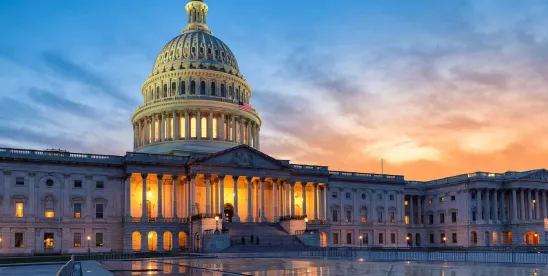THIS WEEK’S DOSE
- 118th Congress Continues to Grapple with Contentious CR. With the collapse of Republican support for the negotiated continuing resolution (CR) package, as of the time of publication on Friday at 3:00 PM EST, Congress is still grappling with how to extend government funding into the new year. At a minimum, we think any final deal will at least provide a short-term extension to a number of expiring health programs.
- House Health Committees Select New Republican Members. Republicans identified new committee members, while House Democrats have yet to name new members for the 119th Congress.
- House Energy & Commerce Committee Announces New Health Subcommittee Chair. Incoming Chairman Brett Guthrie (R-KY) announced today that Rep. Buddy Carter (R-GA) will be the Health Subcommittee Chair.
- CBO Details Options to Reduce Federal Deficit. A Congressional Budget Office (CBO) report highlights options for Congress to consider to reduce mandatory and discretionary spending.
- House Bipartisan Task Force on AI Releases Report. The report recommends that the healthcare industry maintain robust support for healthcare research related to artificial intelligence (AI) and encourages the development of standards for AI liability.
- ASTP/ONC Releases HTI-3 Final Rule. The rule is the second of three expected final rules following the release of a proposed rule from the Assistant Secretary for Technology Policy/Office of the National Coordinator (ASTP/ONC) this summer.
- CMS Actuary Office Data Shows Increased Healthcare, Hospital Spending. Healthcare spending in 2023 reached $4.9 trillion, a third of which was hospital spending, representing a sharp increase compared to 2022.
CONGRESS
118th Congress Continues to Grapple with Contentious CR. Addressing their final agenda item, lawmakers need to at a minimum enact a short-term CR that extends government funding beyond the current CR’s December 20 expiration date. Earlier this week, House Republican leaders brought forth a bipartisan agreement negotiated on both sides of the Capitol to extend government funding through March 14, 2025, and include significant other policies, including disaster relief funding, a Farm Bill extension, and a sizeable package of bipartisan healthcare policies. That package included pharmacy benefit manager reforms, patent reforms, a limited Medicare site neutral policy, Medicaid home- and community-based services policies, a 2.5% offset to the scheduled Medicare physician fee schedule reduction, and a two-year extension of Medicare telehealth flexibilities. However, amid growing concern from House Republicans, President-elect Donald Trump voiced his opposition Wednesday night and pushed for the debt limit to be raised, putting the package in immediate jeopardy. House Republicans in response developed a slimmed down CR on Thursday to raise the debt limit and fund the government into March 2025, with the inclusion of three months of funding for expiring healthcare programs. A vote on that package failed on the House floor with 38 Republicans joining most Democrats in opposition. As of the time of this publication, on Friday at 3:00 PM EST, House Republicans are working to coalesce around next steps to avoid a government shutdown and appear poised to vote on a CR similar to the one that failed on Thursday, without the provision to raise the debt limit. While we think the CR will include short-term extensions of expiring health provisions, it is not yet clear at this time.
Beyond the CR, activity on the House floor this week included passage of numerous public health bills, such as legislation on home care for veterans and funding for autism research. Some of the bills previously passed the Senate and could be signed by President Biden, while others were not voted on in the Senate and will need to be reconsidered next Congress. The House also moved Senate bill S. 4610, which will now go to the president. This bill proposes to do something we all thought had been done centuries ago: naming the bald eagle the official national bird.
House Health Committees Select New Republican Members. The Republican Steering Committee added four new members to the Ways & Means Committee for the 119th Congress: Reps. Rudy Yakym (IN-2), Max Miller (OH-7), Aaron Bean (FL-4), and Nathaniel Moran (TX-1). Ten Republicans have been added to the Energy & Commerce Committee, including three freshmen: Craig Goldman (TX-12), Julie Fedorchak (ND-AL), and Gabe Evans (CO-8). The seven other Republicans joining the committee are Michael Rulli (OH-6), Erin Houchin (IN-9), Russell Fry (SC-7), Laurel Lee (FL-15), Tom Kean (NJ-7), Nick Langworthy (NY-23), and Cliff Bentz (OR-2).
Democrats still need to select their new members on the Energy & Commerce and Ways & Means Committees. Across the Capitol, both Republicans and Democrats need to select new members for Senate committees. With a switch in control in the Senate, Republicans will add new members to both the Finance Committee and the Health, Education, Labor, and Pensions Committee. Democrats also have Finance Committee seats to fill after previous members lost reelection or retired.
House Energy & Commerce Committee Announces New Health Subcommittee Chair. Incoming Chairman Brett Guthrie (R-KY) announced today that Rep. Buddy Carter (R-GA) will be the Health Subcommittee Chair. Carter has been a supporter of extending Medicare telehealth flexibilities and reforming pharmacy benefit managers.
CBO Details Options to Reduce the Federal Deficit. The report comes as Republicans, who will control both Congress and the White House next year, look for ways to reduce federal spending and seek policies that could offset their planned extension of Trump 1.0 tax cuts and other objectives. Healthcare options include reducing federal Medicaid matching rates, reducing Medicare Advantage benchmarks, creating federal spending caps for Medicaid, and implementing Medicare site neutral policies. CBO releases this report regularly; just because an option is included does not mean it is politically tenable or will be pursued, but scoring policies does provide a menu to Members of Congress if they are seeking to find savers. CBO also released a primer explaining how it incorporates administrative and judicial actions when publishing projections of the federal budget and preparing cost estimates.
House Bipartisan Task Force on AI Releases Report. The task force adopted several high-level principles to frame its policy analysis, and the report includes both overarching and industry-specific findings and recommendations. The task force found that the use of AI in healthcare can reduce administrative burdens and speed up drug development and clinical diagnosis. It also found that the lack of ubiquitous, uniform standards for medical data and algorithms impedes system interoperability and data sharing. Healthcare recommendations include maintaining robust support for healthcare research related to AI and supporting the development of standards for liability related to AI issues.
ADMINISTRATION
ASTP/ONC Releases HTI-3 Final Rule. In the Health Data, Technology, and Interoperability (HTI-3) rule, ASTP/ONC finalized:
- The addition of a definition of “reproductive health care” to the information blocking regulation defined terms.
- Select proposed revisions for two existing information blocking exceptions (the privacy exception and the infeasibility exception).
- A new information blocking exception (the protecting care access exception).
ASTP/ONC has divided finalization of the policies that were included in the broad HTI-2 proposed rule, released in July 2024, into three installments:
- The HTI-2 final rule released on December 11 focused on the Trusted Exchange Framework and Common Agreement.
- The December 16 HTI-3 final rule focused on protecting care access.
- The forthcoming HTI-4 final rule will likely address certification updates and other elements of the HTI-2 proposed rule and is expected to be published in March 2025.
CMS Actuary Office Data Shows Increased Healthcare, Hospital Spending. The Centers for Medicare & Medicaid Services (CMS) data show that healthcare spending reached $4.9 trillion in 2023, an increase of 7.5% from 2022. This represents the highest percentage change since 2020. The high spending can mostly be attributed to an increase in insurance coverage and high hospital and prescription drug usage in the private insurance market and in Medicare. Hospital spending alone reached $1.5 trillion in 2023, an increase of 10.4%, which is the largest spending increase since 1990. Despite this increased spending, healthcare expenditures remained 17% of the economy overall, the same percentage as in 2022. While the federal share of healthcare spending decreased, an overall increase in healthcare spending could raise alarm bells on Capitol Hill among conservatives who are concerned about high healthcare expenditures.
QUICK HITS
- Biden Administration Releases Fall 2024 Unified Agenda. The agenda lays out what rulemaking is planned for the remainder of 2024 and into 2025. Given that President-elect Trump will be inaugurated in one month, don’t get too attached to this list. Many of these regulations could be set aside or rewritten, and other regulations will be initiated.
- CMS Calls for Proposals for 2025 Health Equity Conference. Proposals are due to CMS by January 17, 2025, and must focus on the theme “Building a Healthier America.” The Health Equity Conference will be held April 23 – 24, 2025, although it should be noted that this event could be altered or cancelled once the new Administration takes office. More information can be found here.
- CMS Publishes Lessons from AHCAH. The Acute Hospital Care at Home (AHCAH) initiative allows acute care hospitals to deliver inpatient care in a patient’s home. A CMS blog post highlights data from a September 2024 report on the initiative and how it improves care.
- MACPAC Releases 2024 Medicaid, CHIP Data Book. MACStats, released by the Medicaid and CHIP Payment and Access Commission (MACPAC), includes data on Medicaid and CHIP enrollment, spending, and eligibility.
- Four State Medicaid Programs Will Participate in IBH Model. The Innovation in Behavioral Health (IBH) model will begin on January 1, 2025, and Michigan, New York, Oklahoma, and South Carolina will participate. The model involves collaboration between CMS, participating state programs, and community-based behavioral health providers to improve behavioral and physical health.
- CMS Holds Webinar on IOTA Model. The webinar provided an overview of the mandatory Increasing Organ Transplant Access (IOTA) model. The model is scheduled to begin in July 2025 but could be modified or repealed by the incoming Trump Administration.
- CMS Approves California Behavioral Health Section 1115 Waiver. The new waiver, which runs from January 2025 through December 2029, gives California authority to test the effectiveness of innovative practices aimed at strengthening the continuum of community-based behavioral health services. Goals of the waiver include strengthening the workforce, supporting the health of children and youth involved in the child welfare system, and reducing stays in institutional settings for significant behavioral health needs.
- OIG Finds Expenditures for Diabetes and Weight Loss Drugs Rapidly Increased. From 2019 to 2023, Medicaid spending on certain diabetes and weight loss drugs, including glucagon-like peptide 1 receptor agonists, increased by more than 540% to total $9 billion, according to an Office of Inspector General (OIG) report. The report follows CMS’s proposal to require Medicare and Medicaid coverage of weight loss drugs for the treatment of obesity.
- Senate Finance Democrats Release Emergency Reproductive Care Report. The partisan report concludes an investigation into how pregnant women are receiving emergency reproductive care at hospitals in the wake of the Dobbs decision. It assesses how they believe abortion bans conflict with the Emergency Medical Treatment and Active Labor Act.
- Marketplace Sees Record High Enrollment. Over 16.6 million consumers enrolled in marketplace coverage in this year’s open enrollment through HealthCare.gov, and their coverage will begin January 1. Consumers can continue to enroll through January 15 for coverage that begins February 1.
NEXT WEEK’S DIAGNOSIS
Once Congress resolves the CR situation, the 118th Congress will draw to a close. The 119th Congress will begin on January 3, 2025, when members will be sworn in. You can find the combined House/Senate 2025 congressional calendar here. We will next publish on January 10, 2025. We hope you have a happy holiday and a great start to the new year.








 />i
/>i
